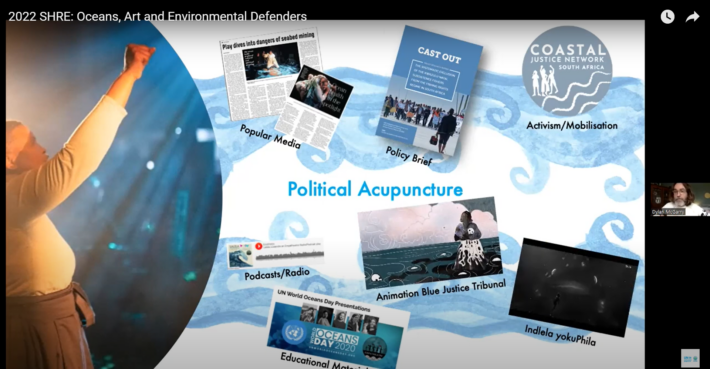Key messages from the UNEP Winter/Summer School on Human Rights “From Oceans to Taps” (Part 2): Children, Ocean Defenders, and Plastics

Screenshot from the webinar ‘Oceans, Art and Environmental Defenders’

The second blogpost will on the Hub’s contribution to the 2022 Summer/Winter School on Human rights and the Environment organized by UNEP and the Global Network for Human Rights and the Environment focuses on key messages and next steps from panels on children rights to a healthy ocean, art and ocean defenders, and ocean plastics.
Children’s rights to a healthy climate, healthy freshwater and a healthy ocean (21st June 2022)
This Panel explores different ways in which children’s human right to a healthy environment can be protected and exercised in different sites related to climate change, freshwater and the ocean. Drawing from activism, empirical and theoretical research, the panellists highlighted barriers and progress in supporting genuine youth engagement in relevant decision-making processes and before courts, and consideration of children’s rights in the context of inter-generational equity.
Key messages
- The international recognition of the human right to a healthy environment is a very exciting space for youth, but how the ocean and children’s rights are connected remains very unexplored, and not considered explicitly in many UN documents.
- the need to integrate environmental protection standards and human rights norms, when considering the obligation of states not to cause transboundary environmental harm and to act with due diligence, is critical for the protection of children’s human rights.
- intergenerational equity is highly significant for the protection of the marine environment for children, and should be considered in the current international negotiations on deep-seabed mining and on a new treaty on marine biodiversity of areas beyond national jurisdiction.
- States have also collective obligations as donors, trade/investment partners, and as international-law makers to give due consideration to children’s’ rights to a healthy ocean, including in the context of climate and ocean research finance.
- There is a great need to develop child-friendly information on, and procedures for youth participation in relevant international decision-making processes on the ocean.
Reflecting on the panel, Dr Aoife Daly (University College Cork, Ireland) commented: ‘We need more academic and other research how crucial a healthy ocean is for children’s rights. And we need to be explicit in our work and in UN documents and standards’. Dr Angeliki Papantoniou (Queen Mary University London, UK) added: “This event recognises the importance of the role of children as active rights holders for the protection of the ocean. There is a need for more research in relation to cooperation mechanisms for the protection of children’s rights, especially in relation to the marine environment in areas beyond national jurisdiction.”
As part of the next steps,
- the Hub continues to contribute to the current development of a new UN General Comment on Children’s rights to a healthy environment (see here and here);
- Hub researchers Dr Alana Malinde S.N. Lancaster (University of the West Indies, Barbados) and Prof Elisa Morgera (University of Strathclyde) and Dr Angeliki Papantoniou are currently working together on a paper on due diligence obligations of states to protect children’s rights against harm to the marine environment for children;
- Prof Elisa Morgera (University of Strathclyde) is collaborating on a Hub inter-disciplinary paper led by early-career researchers Mia Strand (Nelson Mandela University, South Africa) on children’s rights to development, education and participation in relation to a healthy ocean;
- Prof Morgera shared key insights from this panel in a virtual side-event for the UN Ocean Conference (Lisbon, Portugal, 1st July 2022) organized by the Global Youth Biodiversity Network – see video-recording here.
- Angeliki Papantoniou is also writing a paper focusing on the principles of intergenerational equity and common heritage of mankind, for the protection of the marine environment for children.
The event recording will be soon made available here.
Oceans, Art and Environmental Defenders (Wednesday 22nd June 2022)
The event explored the many ways in which art and intangible heritage contribute to both understandings of, and practices for, the environmental defence of the oceans. The panellists offered a space for artists, environmental defenders, researchers, and policy makers to explore the possibilities of the creative arts in their own work towards ensuring the wellbeing of the ocean that sustains us all.
Key messages
- Intangible heritage should be an important part of ocean conservation and management, yet it is not recognised and very seldom taken into account in legal and policy process related to ocean-based economies and governance frameworks.
- Art-based methodologies, such as Empatheatre, bring together different knowledge systems and knowledge holders into conversation with one other, and with the wider public.
- Arts-based approaches can shift narratives towards the importance of intangible heritage in ocean-development and governance agendas, and work closely with, and help build, social movements around the oceans and environmental justice. The Coastal Justice Network in South Africa is one such example.
- Art practice is deeply political and intimately linked with the efforts to care for art, art processes, and communities. It involves an understanding of the past, a vision for the future, and a bridge between the past and the future.
- Art is a powerful tool for political and legal intervention, social mobilisation and activism. For instance:
- The Blue Blanket animation has been used as evidence in a court case on seismic survey in South Africa.
- Poems and school children’s paintings have successfully garnered public and media attention on the negative environmental impacts of mega-port development by Adani in Chennai, India on Pulicat lagoon.
- Tapestries produced through the Keiskama Art Project in South Africa has restored hope and dignity to people with very few resources and provided vital livelihoods.
- artworks communicate the role of the ocean as a source of healing, the realities of rural lives affected by poverty and a history of colonialism and apartheid, and intergenerational stories, contributing to the preservation of memory and pride.
In terms of next steps,
- Dr. Kira Erwin (Durban University of Technology, South Africa), Taryn Pereira (Rhodes University, South Africa), and Dr. Dylan McGarry (Rhodes University, South Africa) have published a book chapter on ocean, art and environmental defenders in Boswell, R., O’Kane, D., Hills, J. (eds) The Palgrave Handbook of Blue Heritage. Palgrave Macmillan, Cham;
- Dr Dylan McGarry is currently organising an art exhibition from August to November 2022 in Cape Town, South Africa.
- The Empatheatre team is also preparing a Lalela uLwandle tour in the Western Cape, South Africa, from 27th September to 2nd October 2022. Lalela uLwandle (“Listen to the Sea” in isiZulu) is a research-based theatre play from South Africa that makes visible stories of those living with the ocean that are seldom seen or heard in the public domain. It weaves together contemporary concerns of diverse coastal communities around intergenerational environmental injustices, tangible and intangible ocean heritage, marine science and the myriad threats to ocean health.
The event recording is available here.
Ocean Plastic and Ocean Waste (23rd June 2022)
The One Ocean Hub was invited to contribute to a panel with colleagues from UNEP, and the UK Universities of Portsmouth and Southampton to explore questions and case studies related to the complex and under-regulated problem of ocean plastics. Panellists examined the complexity of regulatory, policy and scientific responses to the problem of ocean plastics, at different and intersecting geographic scales. Panellists then reflected on the international efforts to develop a new global treaty on the life-cycle of plastics and the importance of learning from local voices and local case studies of community activism.
Key messages
- Communities that are most affected by plastic waste – including small-scale fishers – are often pushed to make use of cheap, disposable, single-use or quick-wearing plastic products. At the same time, their lack of access to waste management and collection facilities has immediate and deleterious effects on environmental health and water quality, and on the ability of small-scale and sustenance fishers to fish.
- Better understanding the cause and impacts of ocean plastics from the combined perspective of human Rights and environmental justice can support system thinking and transformative change.
- We need to support the participation of human rights holders (such as women, children, Indigenous peoples, small-scale fishers, and waste-pickers) in the UN negotiations on a plastic treaty, as a matter of procedural rights rather than generic “stakeholder engagement”
- The combined perspective of human rights and environmental justice is necessary to inform any assessments of the effectiveness of proposed solutions and current measures to ocean plastics.
- Critical knowledge gaps still need be identified and prioritized on the basis of combined perspective of human rights and environmental justice, with a view to informing the application of the precaution approach to ocean plastics solutions and ocean research finance priorities.
As part of our next steps,
- UNEP released a new e-learning course co-developed with the One Ocean Hub on multilateral environmental agreements and ocean plastic (SDG 14.1), which integrates international human rights law. The course titled “Marine Litter and Plastic Pollution: Legal Frameworks” is available on UNEP InforMEA platform (the UN Information Portal on Multilateral Environmental Agreements) upon registration: https://www.informea.org/en
- The Hub and UNEP are developing further information-sheets on human rights and ocean plastics (in addition to those published here, here, here, here and here) on women’s and waste-pickers’ rights in the context of ocean plastics. For more background, see here.
- The Hub is working with the United Nations Institute for Training and Research (UNITAR) to develop a new learning pathway on ocean plastics for the innovative knowledge-translation platform One Ocean Learn. Learn more about One Ocean Learn and register, if you wish to take the existing learning pathways, here.
The event recording will be soon made available here.